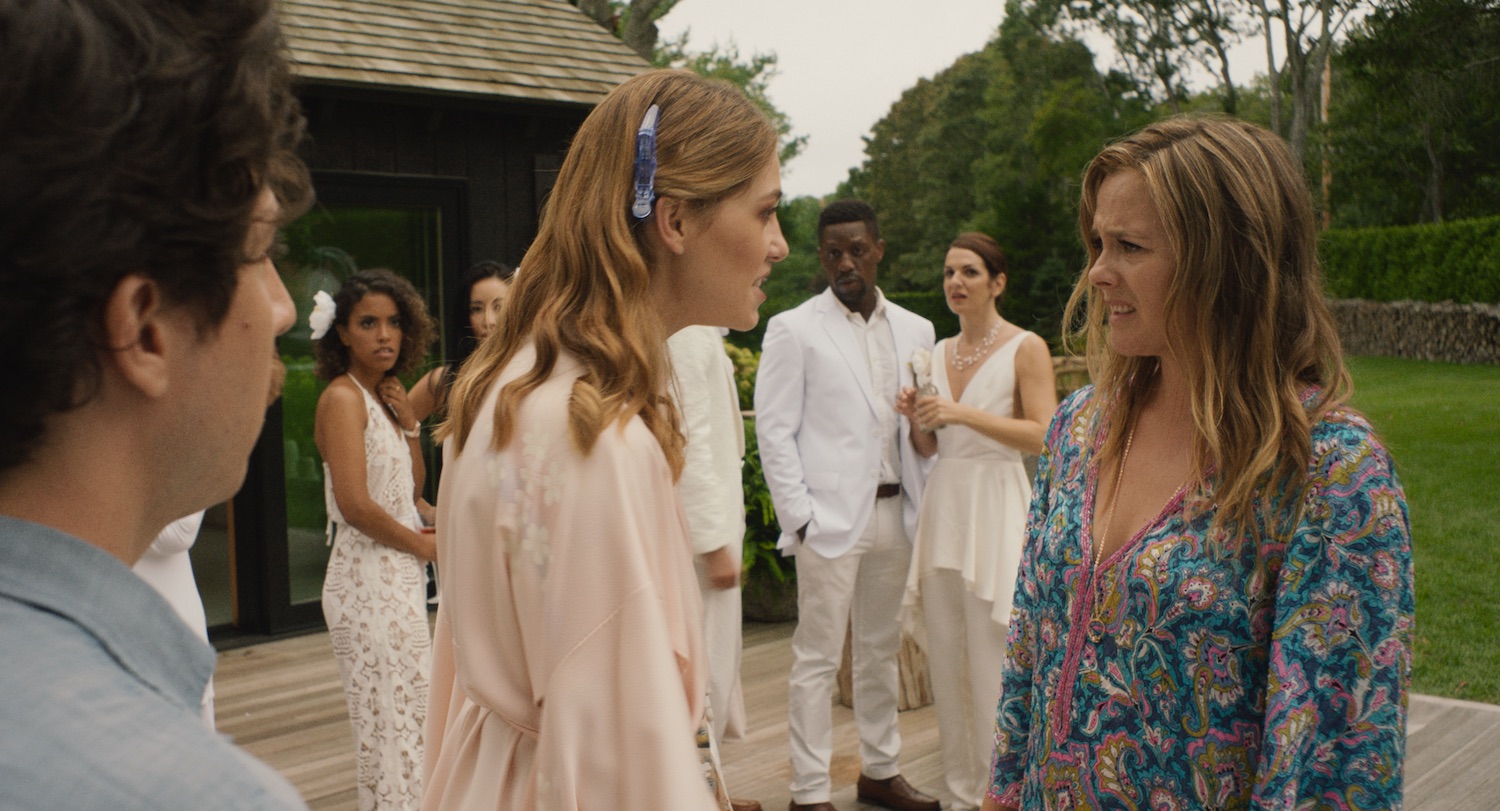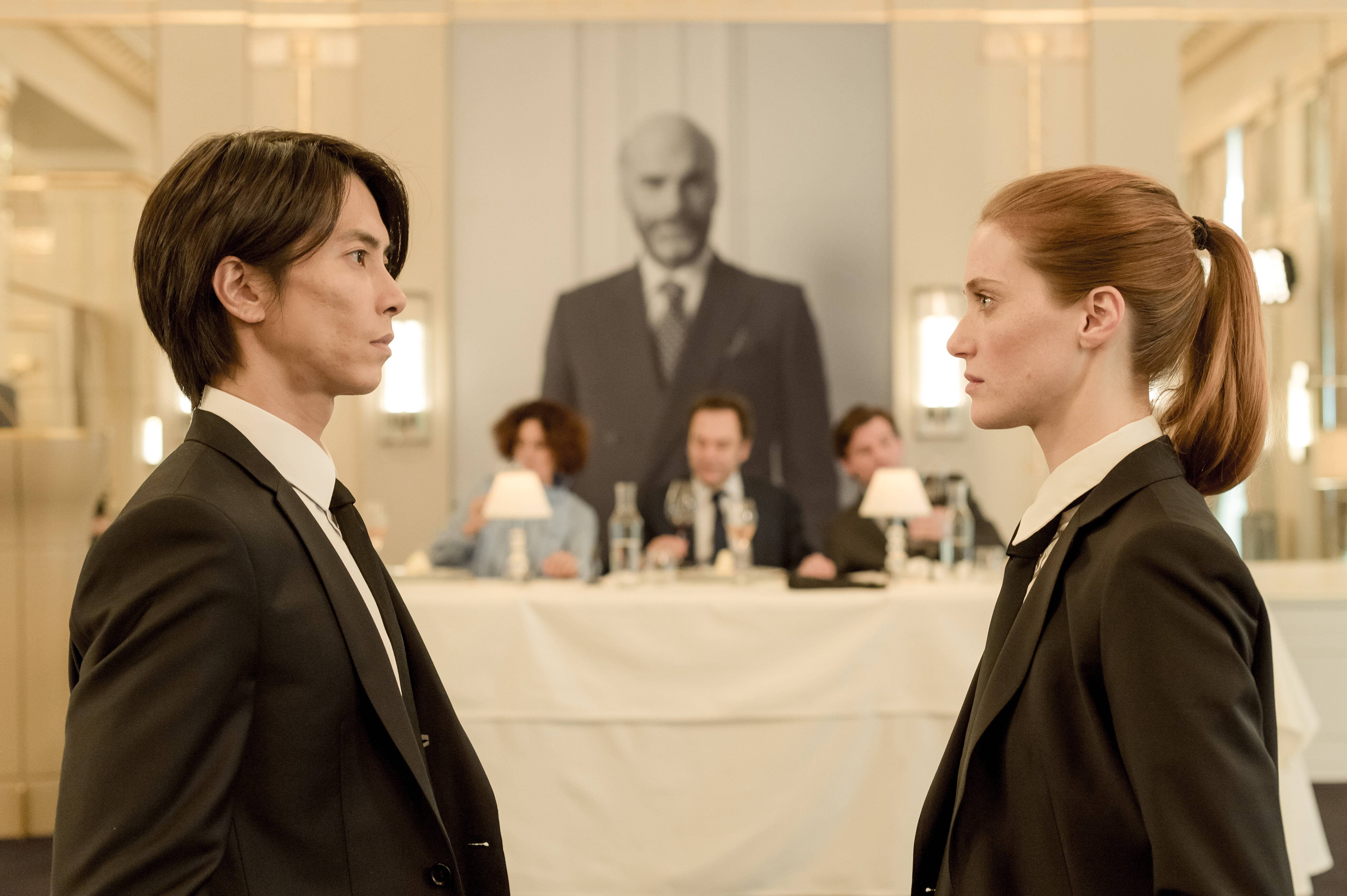What to Watch Verdict
Writer-director Amy Miller Gross can't decide whether she wants this to be a wacky comedy or more measured character study.
Pros
- +
💐 The movie's premise offers tons of potential for great ideas and feelings to explore.
- +
💐 Tom Everett Scott is terrific as the title character's observant, endlessly patient husband.
Cons
- -
💐 Gross' focus on comedic set pieces undercuts the insights she aims to spotlight.
- -
💐 Silverstone's manic performance fails to capture her character's plight in a meaningful way.
A movie like Sister of the Groom is more exasperating than one that’s just lazy or plain old bad, because it clearly has real ambitions. Is it an effervescent comedy, a thoughtful character piece, or a wry cultural study? The further writer-director Amy Miller Gross ventures into her story of a woman attending her brother’s wedding, the less certain an answer becomes. Alicia Silverstone’s lead performance unfortunately only confuses the film’s tone further while Gross ping pongs between wacky moments that should be affecting and vice versa to arrive at an awkward crossroads between Rachel Getting Married and a Jewish-themed My Big Fat Greek Wedding.
Silverstone (The Lodge) plays Audrey, a housewife trying to rekindle her career as an architect, and regain her youthful figure, as she nears 40. She laments the loss of both as she and her husband Ethan (Tom Everett Scott) drive to her younger brother Liam’s (Jake Hoffman) wedding in upstate New York, where she’ll meet his fiancée Clemence (Mathilde Ollivier) and her French family for the very first time. Arriving at their family’s longtime home, which Liam bought several years ago, Audrey immediately disapproves of the demanding, artistic Clemence and her bohemian relatives. But when Liam catches her off guard with news that he’s renovating their family compound — and hired her ex-boyfriend Isaac, also an architect, to do the work — Audrey’s anxieties kick into overdrive, feeling more estranged than ever from her family and from the plans she abandoned years before to start a family.
Audrey succumbs to a series of minor outfit disasters exacerbated by insecurities about her sagging post-children waistline, while Liam discovers new information about Clemence that makes him consider calling off the wedding. But after having her own showdown with Clemence and learning that Isaac, who she hasn’t seen in years, will be attending the wedding, Audrey ventures into town to find a replacement dress so she’ll at least look like a million bucks on the outside, even if she feels like two bits on the inside. As the wedding unfolds, she gets progressively more intoxicated juggling her husband’s attention and Isaac’s, while coming awkwardly to terms with the woman her brother is marrying and the changes happing all around that she begins to fear will leave her behind.
As the film begins, Audrey details her ambitions and insecurities while she and Ethan drive to the wedding — before she’s interrupted by a coffee mishap on her outfit. A mess like that can certainly set the wrong tone for an intended few days of joy and celebration, and Clemence’s comically French family does little to alleviate her concerns about the person her brother is marrying. But it’s easy to see her point of view, at least initially, so when she reacts very honestly during the rehearsal dinner to news that Liam has hired her ex-boyfriend to raze and rebuild their family home, audiences will almost certainly be in Audrey’s corner. Truthfully, it’s difficult to watch Clemence flit around half naked to the meditative strains of her ubiquitous songwriter’s guitar and not hate her and everyone else in the wedding party instantly.
But Gross’ story somehow makes a shift where Audrey stops being the outsider watching her brother’s hermetically-sealed hipster lifestyle and turns into a miserable faultfinding harpy with no sensitivity or discretion. She becomes cruel and casually insulting, picks fights, and reveals information to her brother’s guests that she has no right to share. Audrey admits at one point that she has “difficulty letting go when she believe she’s been wronged,” but it becomes clear that any choice that someone else makes (about anything) is an offense to her, especially if it yields a different result. And of course, learning to look with clear eyes at one’s own past in order to be supportive in the present and constructive in the future is a profound arc for a character. But Gross allows wedding-night hijinks to derail what could have led audiences on that much more meaningful journey.
To that end, Audrey and her husband drink horny tea at the wedding with plans to consummate her 40th birthday by making love in the bunk beds that Liam assigned them, but when Isaac arrives, she seems to forget Ethan altogether and focus on her hunky ex — so much so that Ethan, dealing with some disappointing career news of his own, gets angry and leaves. Her reunion with Isaac is a particularly disappointing depiction of self-inventory, getting neither clarity that she chose the right path or revisiting that fork in the road with renewed success. She then takes MDMA from Clemence’s brother, gets interrupted while masturbating in a bathroom, and finally decides to dose the wedding cake Clemence is meant to eat. The problem is less that these things happen than they don’t happen meaningfully, except to complicate Audrey’s efforts to process a new reality where her little brother and onetime best friend has married a douchebag supermodel singer while she’s languishing in suburban domesticity. Even if Liam’s eventual explanation for why he’s marrying Clemence wasn’t the saddest thing you’d ever heard, surely it would provide Audrey with more perspective why her own life and especially what appears to be a very happy marriage is not so dire as she seems to think.
Truthfully, there’s much to love and think about just in the premise of a woman thoughtfully wrestling with turning 40 at a time in history when women are encouraged to want more even if what they have is actually pretty good, and they might be happy about it without constant reminders that it’s somehow not enough. Or conversely there’s lots to explore about the idea of selflessness and accepting that others may not have the same goals or needs in their lives that we do, and so we must try to be supportive of the happiness they find without demanding that others find it the same ways. But for an actress who learned at least a few of these lessons in her signature role in Clueless more than two decades ago, Silverstone struggles to juggle all of the disparate feelings her character has throughout the gauntlet of her brother’s wedding weekend, so the audience doesn’t get a sense of how in her corner they’re meant to be.
It’s also possible that Amy Miller Gross is either a very good writer or a very good director, but not both — or at least they’re two tasks that shouldn’t have overlapped here. But ultimately, her second film feels like a more profound disappointment not because it’s a bad idea, but precisely because it has so much going for it. With a lesser movie it would have felt appropriate to end this review with a glib dismissal like ‘just RSVP no,’ but if Audrey’s plight sounds remotely relatable based on the information above, the best way to support Sister of the Groom is to look for those deeper lessons but not watch the rest too closely.
Sister of the Groom will be available to stream December 18th, 2020.
Todd Gilchrist is a Los Angeles-based film critic and entertainment journalist with more than 20 years’ experience for dozens of print and online outlets, including Variety, The Hollywood Reporter, Entertainment Weekly and Fangoria. An obsessive soundtrack collector, sneaker aficionado and member of the Los Angeles Film Critics Association, Todd currently lives in Silverlake, California with his amazing wife Julie, two cats Beatrix and Biscuit, and several thousand books, vinyl records and Blu-rays.












